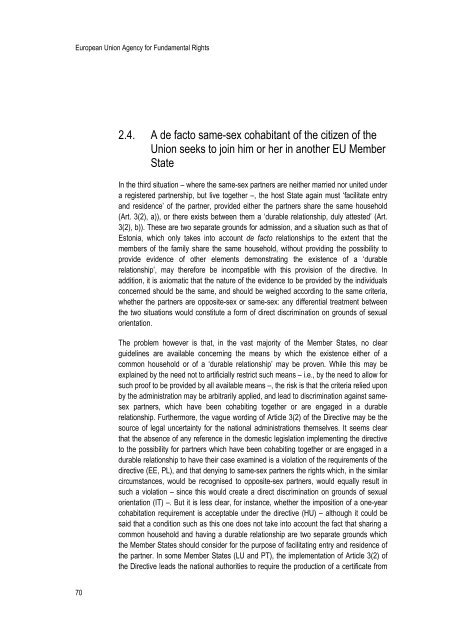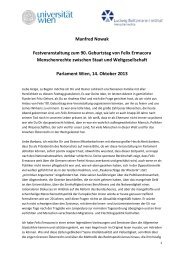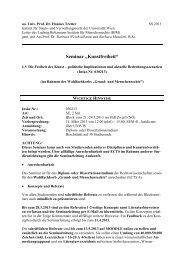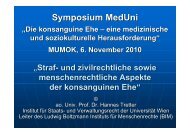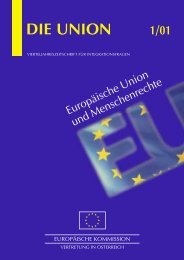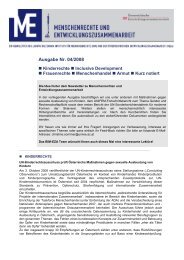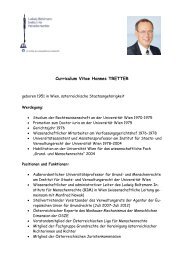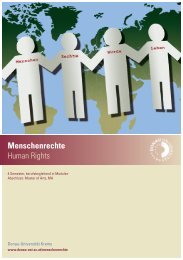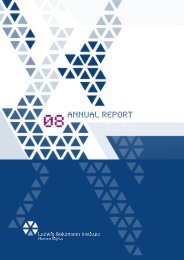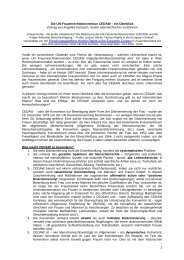Homophobia and Discrimination on Grounds of Sexual Orientation ...
Homophobia and Discrimination on Grounds of Sexual Orientation ...
Homophobia and Discrimination on Grounds of Sexual Orientation ...
Create successful ePaper yourself
Turn your PDF publications into a flip-book with our unique Google optimized e-Paper software.
European Uni<strong>on</strong> Agency for Fundamental Rights2.4. A de facto same-sex cohabitant <strong>of</strong> the citizen <strong>of</strong> theUni<strong>on</strong> seeks to join him or her in another EU MemberStateIn the third situati<strong>on</strong> – where the same-sex partners are neither married nor united undera registered partnership, but live together –, the host State again must ‘facilitate entry<str<strong>on</strong>g>and</str<strong>on</strong>g> residence’ <strong>of</strong> the partner, provided either the partners share the same household(Art. 3(2), a)), or there exists between them a ‘durable relati<strong>on</strong>ship, duly attested’ (Art.3(2), b)). These are two separate grounds for admissi<strong>on</strong>, <str<strong>on</strong>g>and</str<strong>on</strong>g> a situati<strong>on</strong> such as that <strong>of</strong>Est<strong>on</strong>ia, which <strong>on</strong>ly takes into account de facto relati<strong>on</strong>ships to the extent that themembers <strong>of</strong> the family share the same household, without providing the possibility toprovide evidence <strong>of</strong> other elements dem<strong>on</strong>strating the existence <strong>of</strong> a ‘durablerelati<strong>on</strong>ship’, may therefore be incompatible with this provisi<strong>on</strong> <strong>of</strong> the directive. Inadditi<strong>on</strong>, it is axiomatic that the nature <strong>of</strong> the evidence to be provided by the individualsc<strong>on</strong>cerned should be the same, <str<strong>on</strong>g>and</str<strong>on</strong>g> should be weighed according to the same criteria,whether the partners are opposite-sex or same-sex: any differential treatment betweenthe two situati<strong>on</strong>s would c<strong>on</strong>stitute a form <strong>of</strong> direct discriminati<strong>on</strong> <strong>on</strong> grounds <strong>of</strong> sexualorientati<strong>on</strong>.The problem however is that, in the vast majority <strong>of</strong> the Member States, no clearguidelines are available c<strong>on</strong>cerning the means by which the existence either <strong>of</strong> acomm<strong>on</strong> household or <strong>of</strong> a ‘durable relati<strong>on</strong>ship’ may be proven. While this may beexplained by the need not to artificially restrict such means – i.e., by the need to allow forsuch pro<strong>of</strong> to be provided by all available means –, the risk is that the criteria relied up<strong>on</strong>by the administrati<strong>on</strong> may be arbitrarily applied, <str<strong>on</strong>g>and</str<strong>on</strong>g> lead to discriminati<strong>on</strong> against samesexpartners, which have been cohabiting together or are engaged in a durablerelati<strong>on</strong>ship. Furthermore, the vague wording <strong>of</strong> Article 3(2) <strong>of</strong> the Directive may be thesource <strong>of</strong> legal uncertainty for the nati<strong>on</strong>al administrati<strong>on</strong>s themselves. It seems clearthat the absence <strong>of</strong> any reference in the domestic legislati<strong>on</strong> implementing the directiveto the possibility for partners which have been cohabiting together or are engaged in adurable relati<strong>on</strong>ship to have their case examined is a violati<strong>on</strong> <strong>of</strong> the requirements <strong>of</strong> thedirective (EE, PL), <str<strong>on</strong>g>and</str<strong>on</strong>g> that denying to same-sex partners the rights which, in the similarcircumstances, would be recognised to opposite-sex partners, would equally result insuch a violati<strong>on</strong> – since this would create a direct discriminati<strong>on</strong> <strong>on</strong> grounds <strong>of</strong> sexualorientati<strong>on</strong> (IT) –. But it is less clear, for instance, whether the impositi<strong>on</strong> <strong>of</strong> a <strong>on</strong>e-yearcohabitati<strong>on</strong> requirement is acceptable under the directive (HU) – although it could besaid that a c<strong>on</strong>diti<strong>on</strong> such as this <strong>on</strong>e does not take into account the fact that sharing acomm<strong>on</strong> household <str<strong>on</strong>g>and</str<strong>on</strong>g> having a durable relati<strong>on</strong>ship are two separate grounds whichthe Member States should c<strong>on</strong>sider for the purpose <strong>of</strong> facilitating entry <str<strong>on</strong>g>and</str<strong>on</strong>g> residence <strong>of</strong>the partner. In some Member States (LU <str<strong>on</strong>g>and</str<strong>on</strong>g> PT), the implementati<strong>on</strong> <strong>of</strong> Article 3(2) <strong>of</strong>the Directive leads the nati<strong>on</strong>al authorities to require the producti<strong>on</strong> <strong>of</strong> a certificate from70


